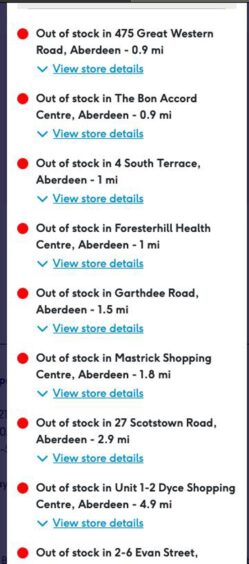NHS Grampian has urged parents of children on some ADHD medications to ration supplies as a UK shortage spreads north.
The north-east trust said stocks of seven ADHD medications are in short supply nationwide in a situation likely to last until next year.
It advised parents to try different pharmacies to fulfill prescriptions but also to limit intake to “essential days” such as school days.
NHS Grampian said parents can also reduce the frequency of doses down from three or two to one or the dose itself if on multiple tablets.
Meanwhile, NHS Grampian warned not to abruptly stop medication if the child is using Intuiv, also known as Guanfacine, as this can cause side effects. Instead, the dosage should be lowered over time.
“We are really sorry for the upset and stress this may cause but we are confident that together we will be able to overcome this difficult time,” NHS Grampian said.
Read on to find out:
- Why there is a UK-wide shortage of ADHD medication
- Why a north-east parent of a child with ADHD thinks the shortages are “stressful”
- What an Inverness adult with ADHD is doing to deal with the shortages
A national crisis for people with ADHD
A National Patient Safety Alert issued on September 27 alerted England’s NHS bodies to supply disruptions to a number of medications for the treatment of attention deficit hyperactivity disorder (ADHD).
The disruptions have been caused by combination of manufacturing issues and increased global demand, the alert said. Other ADHD products are available but they cannot meet the shortfall.
Since the alert, NHS trusts across the UK have issued warnings to patients.
On October 17, NHS Grampian told patients, parents and carers not to order repeat prescriptions if there are more than 14 days of medication remaining, “as this may worsen the supply issues”.
NHS services have been sending letters over the past fortnight to people affected by the shortages, an NHS Grampian spokesperson said.
Medication shortages at a ‘critical level’
Phionna McInnes, chief executive of north-east charity WeToo for parents with children with additional support needs, said the shortages are “incredibly stressful for anyone who has a relationship with someone with ADHD”.
Ms McInnes, who is a parent of a child with ADHD, shared with the Press and Journal an internet search for ADHD medication Elvanse showing all nearby pharmacies out of stock.
“The shortages have been an issue for some time,” she continued. “Now the pharmacies have all run out of stock with no national availability to replenish it has hit a critical level.”
Meanwhile, she warned that “stepping on and off medication is never really a good idea” as it can mean side effects such as increased heart rate and reduced appetite “will never settle down if the medication is on stop/start”.
“Many ADHDoers will take breaks from their medication, but this should be their choice, not because of medication shortages,” Ms McInnes said.
Shortages of ‘a lifesaving medication’
Ashley Hope, who runs Inverness ADHD support group Dopamine Dolls, said the advice to ration underlines the critical need for medication as shortages enter a third week.
Ms Hope, who was diagnosed with ADHD last year, warned the shortages are already causing concern in the ADHD community.
“It’s a pretty dire situation to be in,” she said.
“For some people, it is essential every day. It’s definitely a lifesaving medication.”
However, Ms Hope said that no matter how critical the shortages get, it is important that ADHD patients do not share medication.
“There are people that feel quite desperate at times,” she says, “but it’s really important that people do not share them.”
To help cope with the shortages, Ms Hope’s Dopamine Dolls group is holding sessions on ways to manage ADHD that isn’t medication-based.
But she added that people with ADHD are not the best people to ask to make changes to medication or routines.
“It’s a hard thing for us to go out hunting in five different pharmacies until you find your medication,” she explained.
“As desperate as some of us are, we also struggle with executive functioning, so the idea that we’re going to be able to manage our time well enough to hunt down medication, it’s almost laughable.”
A spokesperson for NHS Highland said the trust has not made any public statement regarding the recent shortage of medicines for ADHD in the UK.
It has released an information leaflet that contains practical tips and advice for patients and caregivers affected by the shortages.



